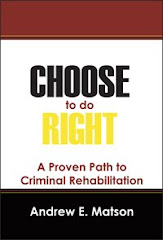The best way to get over feeling sorry for yourself is to serve others.
http://www.choosetodoright.com/
December 13, 2010
December 11, 2010
Obligations
When you fulfill your obligations to others you ultimately fulfill an obligation to yourself.
http://www.choosetodoright.com/
http://www.choosetodoright.com/
December 6, 2010
Judging right and wrong
The easiest way to judge between right and wrong is to assess the potential consequences of our choices and behavior. We should also examine whether our values, standards, and beliefs are causing the consequences we want in our lives.
http://www.choosetodoright.com/
http://www.choosetodoright.com/
December 4, 2010
A Clean Conscience
Our conscience is like a mirror in which our soul reflects upon itself and weighs what it sees against the highest standard of reality we perceive. And, much like any mirror, this reflection will become more realistic and clearer when we clean it. When we eliminate the blemishes caused by our past atrocities (along with their excuses and justifications) we enable ourselves to recognize reality and see things more clearly. Not only do we increase our ability to realistically judge between wrong and right, but we also augment our human capacity to be emotionally guided by this judgment.
http://www.choosetodoright.com/
http://www.choosetodoright.com/
December 2, 2010
Our Conscience
I believe that as human beings we are innately moral creatures. Most of us have the internal ability to judge between right and wrong, good and bad. And, we have the capacity to be emotionally guided by this judgment. We have a conscience. However, listening to our conscience requires effort and sacrifice. It requires choosing to pay attention.
November 30, 2010
Reaching Goals
We should always focus on the little steps that are necessary to achieve our goals and struggle to build a successful life like we would a house - one brick at a time.
http://www.choosetodoright.com/
http://www.choosetodoright.com/
November 28, 2010
Using today to create our future
Our life is transitory. Eventually, the day will come when it is no longer full of possibilities and potential, but only memories. Thus, we must learn to view the present, the here and now, as the time to make the most of our opportunities, strive towards our potential, and build a meaningful life. Today is the day that we create our memories and shape the legacy we will eventually leave behind. The legacy which, for good or bad, will be our eternal mark on posterity and will determine how we will be remembered, and how we will spend the rest of eternity.
November 23, 2010
True Virtue vs. Transient Sentimentality
Although transient sentimentality and true virtue may have considerable external resemblance, they are easily distinguishable. Transient sentimentality is a selfish hypocrisy and does not endure, except as long as it fulfills its selfish purpose. However, true virtue is a selfless part of who we are. It wants nothing in return and thus it abides firm and constant.
November 21, 2010
Personal Growth
The best opportunities for emotional growth and development come when we are emotionally charged. Although we can work to prepare ourselves, it is difficult to practice overcoming our anger, boredom or depression until we are confronted with these emotions. Furthermore, I believe that the more intense these emotions are the more we can grow by overcoming them. For example, the best time for us to work on developing self-denial is when we are confronted with doing something we would really like to do, but that isn’t in line with our responsible goals and purpose. And the more we would like to do it (or the harder it is not to do it) the greater our opportunity is for growth. Similarly, the best opportunity to improve our self-discipline comes when we are confronted with obligations that need to be fulfilled, but we really don’t feel like taking the initiative to do them. And again, the more we don’t want to do them, the greater the opportunity we have for personal growth by overcoming our feelings and taking the initiative required to fulfill the obligations. This principle is the same for any type of personal growth.
November 19, 2010
Responsible Relationships - Being Assertive
Being assertive in a relationship doesn’t mean being pushy, it means living with honesty and an open integrity in order to be fair to ourselves and others. It means actively seeking to understand things from another’s perspective, and then to communicate in ways in which we are fully understood. It means openly exchanging ideas, feelings, and concepts with others and then struggling to take their thoughts and perspectives into consideration. It means saying “yes” when it is in the responsible best interest of the relationship and not being afraid to say “no” when we are asked to do things against our better judgment. It means learning to form a balance between ourselves and others – one that is founded on empathy and understanding, and directed by our purpose and responsible objectives.
Subscribe to:
Comments (Atom)

